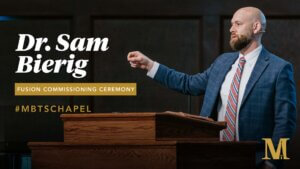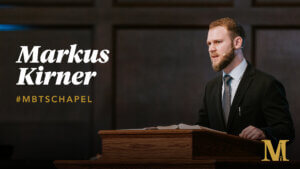KANSAS CITY, Mo—Midwestern Seminary welcomed Andrew T. Walker to campus on March 25 to deliver the annual Scudder Lecture. Walker, who serves as associate professor of Christian ethics and public theology at Southern Seminary, presented a Christian theology of free speech.
President Jason Allen expressed his gratitude for Walker, saying, “When we think about these lectureships, we seek to bring someone who will serve this institution well, who resonates theologically with us, who loves the local church, and whom we believe we can commend to our campus community wholeheartedly. We’re delighted to once again have such a speaker, Dr. Andrew Walker.”
The Scudder Lecture series brings a guest speaker to campus to explore the biblical basis for dealing with contemporary social challenges and ethical issues. Walker’s lecture explored the biblical grounds of free speech, focusing on the image of God in humanity and humankind’s responsibility to pursue and reflect the truth.
Walker began by noting the relationship between freedom and the image of God. He highlighted the role of human rationality and agency in reflecting the image of God, who formed creation by His words.
“A Christian view of freedom recognizes that certain human choices will align with the order and purpose of God in creation, and that freedom exists precisely for this end,” Walker said. He added, “Speech is a corollary and an outworking of our rationality and agency” with the aim of “bringing order to God’s world.”
Next, Walker dove deeper into the purpose of speech according to Scripture. He noted the numerous biblical commands concerning speech, such as prohibitions on lying and exhortations to speak the truth in love. He also noted the many ways Scripture depicts speech, including its power to build up and tear down, its reflection of a person’s heart, and its function in salvation.
“The meta-telos of our speech is the proclamation of the gospel,” Walker said.
He went on to note that while speech is meant to accomplish godly ends, speech is not a good in and of itself. “What we do with our speech constitutes the value of our speech,” he explained, adding, “While freedom of speech in our context means liberty to engage in any type of speech that the agent wants to engage in, that is far from the worldview of the Bible, where truth and virtue condition our speech toward the highest virtue, which is love.”
Third, Walker explored the government’s relationship to speech. Citing Romans 13:1–7 and 1 Peter 2:13–17, he addressed the government’s purpose to bring order, punish evil, and protect good.
After noting that the Bible limits government’s authority, he added, “A surface level reading of Scripture would indicate that God gives no explicit, direct authority to the government over humankind’s speech.” In light of this, Walker pointed out the difficulty of determining “how exactly speech and public order rise to the level of government intervention.”
From here, Walker turned to discuss the Christian view of human rights. He warned that modern discussions of human rights can tend to depart from Scripture’s worldview because of the influence of secular individualism. Drawing on Christian tradition, Walker proposed that Christians can instead understand political rights in light of humanity’s moral responsibilities. He offered an example regarding speech, saying, “A duty to speak truthfully, as the Bible demands, requires the corresponding ability to exercise this moral power.”
He went on to say, “Rights exist to protect the ability of individuals to fulfill moral duties consistent with a God-given human nature and God-defined human flourishing. Rights do not protect moral evil for the sake of moral evil as such.”
Finally, Walker combined the previous observations to put forth a theology of free speech. “A theology of free speech understood by Christians is grounded predominantly in a doctrine to pursue truth as rational agents made in God’s image,” he said.
He continued, “The common good requires that members of society enjoy a right to use their speech in ways that allow them to order themselves and the whole of society toward truth.”
Walker addressed government’s role to discern how and when speech should be limited to protect these goods. He concluded by noting the eschatological importance of the freedom to pursue truth, as well as the biblical tension that the truth will be challenged until Christ returns.
“In the end, everyone’s future hinges on free speech,” he said. “The truth of Christ’s kingship will finally be established when God judges every word we have spoken. For by your words, you will be justified, and by your words, you will be condemned.”
To watch this year’s Scudder Lecture, click here.


